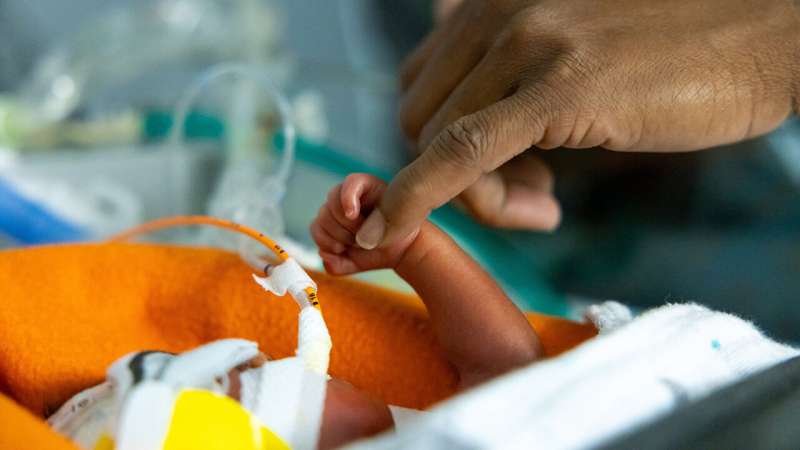This article has been reviewed according to Science X's editorial process and policies. Editors have highlighted the following attributes while ensuring the content's credibility:
fact-checked
trusted source
proofread
Study shows value of donated breast milk for extremely premature infants

Extremely premature infants who were fed donated breast milk had less than half the rate of a life-threatening disease than those fed formula, according to a new study led by the University of Iowa.
Researchers also found extremely preterm infants—classified as babies born before 29 weeks—who were fed donor milk experienced the same neurological development as those who were fed formula.
Extremely preterm infants are at high risk for neurodevelopmental impairment (including difficulties with language and speech, motor skills, behavior, memory, learning, and other functions) and necrotizing enterocolitis, a condition in which the lining of the intestines becomes inflamed and dies, which can be fatal for the baby.
While it is widely accepted that extremely preterm infants fare best when fed breast milk from their own mothers, less was known about the outcomes associated with those fed donated breast milk or formula. This is important because some mothers may not be able to either supply breast milk, or they are unable to do so in quantities the child needs.
In either case, neonatologists can turn to feeding those babies donated milk or formula. The study addressed whether one option was better for their development.
"What we showed in this study is that there was no disadvantage developmentally with the use of donor milk, which in itself is an important finding," says Tarah Colaizy, professor of pediatrics–neonatology in the Stead Family Department of Pediatrics at the UI Carver College of Medicine and the study's corresponding author.
"We also verified that if you don't have mother's milk as a choice, the use of donor milk compared to preterm formula is associated with a decreased incidence of necrotizing enterocolitis."
The findings also are important for potentially updating recommendations about donor milk, which had been used sporadically in hospitals until about 15 years ago and for which questions about its value remain.
In 2012, the American Academy of Pediatrics published a policy statement endorsing the use of donor milk that has been pasteurized and fortified with essential nutrients. However, the recommendation was not universally accepted because there was little evidence to support the opinion.
Since then, smaller studies involving preterm infants have shown no drawbacks associated with using donor milk.
Colaizy's double-blind, randomized clinical trial intended to provide the clincher. She and her team spent seven years recruiting 483 extremely preterm infants who weighed less than 1 kilogram (about 2.2 pounds) at birth from 15 Neonatal Research Network centers in the United States, by far the largest and most extensive population to be studied. These infants were given either donor milk or formula in bottles with covered labels.
Researchers allowed the neonatal intensive care unit (NICU) at each hospital to determine the feeding schedule, frequency, and dosage, among other factors.
"Everybody did it differently in terms of nutritional management. And that's the real world. We replicated real-world conditions," Colaizy says.
When the infants reached the equivalent of 22 to 26 months of development (corrected for their prematurity), they were tested with the Bayley Scales of Infant Development, a test used to identify children at risk of developmental delays.
The average cognitive score for the donor milk group was 80.7, compared with 81.1 for the formula group, an insignificant difference. The average score for full-term babies tested at 22 to 26 months is 100. Similarly, language scores and motor scores did not differ significantly between groups.
However, necrotizing enterocolitis developed in 10 infants (4.2%) in the donor milk group, compared with 22 infants (9%) in the formula group.
"This research validates the existing American Academy of Pediatrics recommendations for donor milk use in this very low birth weight infant population, because now we have additional evidence from a gold-standard type of study," says Colaizy, who has studied donor milk use in NICUs since 2006.
One of the study centers was UI Stead Family Children's Hospital, where neonatologists use donor milk from the Mother's Milk Bank of Iowa, which was founded in 2003 and was one of the first donor milk centers in the U.S.
"We were a pioneer in the use of donor milk in NICUs and in founding this nonprofit milk bank," Colaizy says. "We are always looking for donors."
The study, "Neurodevelopmental outcomes of extremely preterm infants fed donor milk or preterm infant formula" is published in JAMA.
More information: Tarah T. Colaizy et al, Neurodevelopmental outcomes of extremely preterm infants fed donor milk or preterm infant formula, JAMA (2024). DOI: 10.1001/jama.2023.27693


















